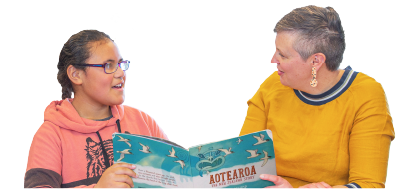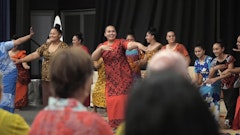Authentic community partnerships
Show video transcript
Title slide: Authentic community partnerships
Rhonda Duncraft, Centre Manager, Teacher, Sydenham Community Preschool, Christchurch, facing camera
Images of new centre environment
For us at Sydenham Community, after the earthquake we were provided with a new centre. So for us coming into a new community it was looking at who is in our community, what is the community, what does it contain?
So as new teachers in a new environment we needed to spend quite a bit of time researching, looking at who are the people in our community. So for us it really identified that Pacific whānau were quite prevalent in our community and that we needed to look at what we were offering within our centre, what did our programme provide, what were our teachers aware of, and looking at how could we support everybody to be inclusive in our community.
And within that we identified what we needed in our centre and what our teachers needed to learn. So with that leadership model in our PLD we looked at making sure that the partnership was authentic, that it was a warm and inviting environment. And that what we were doing is maintaining the learning and not just the tokenism, you know, we'll put up a few posters, we'll get a few artifacts. It was actually living how they live and getting a really deep understanding of how Pacific families operate and what is their home life like, what does that look like for us? And as teachers, are we inviting and inclusive?
Reverend Pennie Vaione Otto, Deputy Principal, Manurewa High School, Auckland, facing camera
So how we acknowledge, encourage, and strengthen student identity in this school is through Polyfest, which is a really big one to capture our kids at the start of the year. We've got over, we've got about 500 students who are involved in Polyfest at our school. We've got eleven groups in our school. This year I'm looking to grow that by adding another three or four groups at the end of the year for next year. So that's one of the ways and it's probably the biggest way to capture our kids at the start of the year. Not only our students but also our families.
Daya Naidoo, Teacher, Manurewa High School, Auckland, facing camera
Groups of students performing
We celebrate the diversity at our school not in word but in action. And that comes through, you know, the celebration of the language weeks that we have throughout the year. The Polyfest is really a big one.
This year we've introduced to the repertoire of events that we have where we've added the meke, the Fijian meke/indigenous meke group, this year which just adds that potpourri that we already have at our school.
Rhonda Duncraft, Centre Manager/Teacher, Sydenham Community Preschool, Christchurch, facing camera
So we spent over a year with some PLD. And for us that was the most valuable thing that could have happened. So looking at how we teach. Making sure that we had a Pasifika teacher to maintain... if you want to maintain language you've got to live the language every day. So not just, let's learn a couple of words. Let's have this teacher in the centre.
So we employed a Pasifika teacher, which had a roll-on effect throughout the whole centre. So everybody was learning together. And it was, our children learned together, we learned together, and it was a really genuine space that everybody was welcome and quite transparent. But also learning the culture but also learning how we as Palagi teachers assume how all children learn and it's not that way at all. So making sure that we knew our Pasifika children had different ways of doing things, so there is normalisation within our centre. It's not, you know, two different setups for things. It’s really inclusive.
After the earthquake in Christchurch, Sydenham Community Preschool was provided with a new centre. Lead teacher, Rhonda, explains the steps they took to build a truly inclusive environment based on a deep understanding of how their Pacific families operate. Key steps included:
- researching and getting to know who the people in their community were
- teacher PLD to understand how Pasifika students learn, language and culture
- identifying what to offer in their programme and how to deliver it to support their Pacific learners.
Reflections for individual teachers
Cultural responsiveness does not mean just learning about others. Developing an awareness of your own cultural identity is an important tool for developing cultural understandings. This means critically reflecting on, and coming to understand, how identity, language and culture influence your own life and your own identity so you can develop an appreciation of complexity rather than reinforce stereotypical understandings.
Understanding your Pasifika community in more depth – Challenge
Participate in events and activities to learn more about your local community:
What local groups can you connect with?
What groups or activities are the families from your centre involved in?
What events are occurring in your local Samoan or Tongan community?
Consider attending a local church service, sporting, cultural, or political event that your Pasifika families attend so you can grow your understanding and get to know your families and communities in more depth.
Reflections for staff or departments
“Relationships with parents, family, and community need to go beyond communication about achievement. Build relationships where you are working together to support student success.”
Strategic goals around parental engagement are supported by PLD for staff. In the video, Lead teacher, Rhonda, described how they spent over a year with PLD focused on building a depth of understanding of Pasifika culture and language to develop a genuine, welcoming space that met the diverse learning needs of their community.
Identify how your centre is/can engage in ongoing PLD to:
- make sure that partnership is authentic
- create a warm and inviting environment
- work with parents, family, and community rather than a token consultation.


